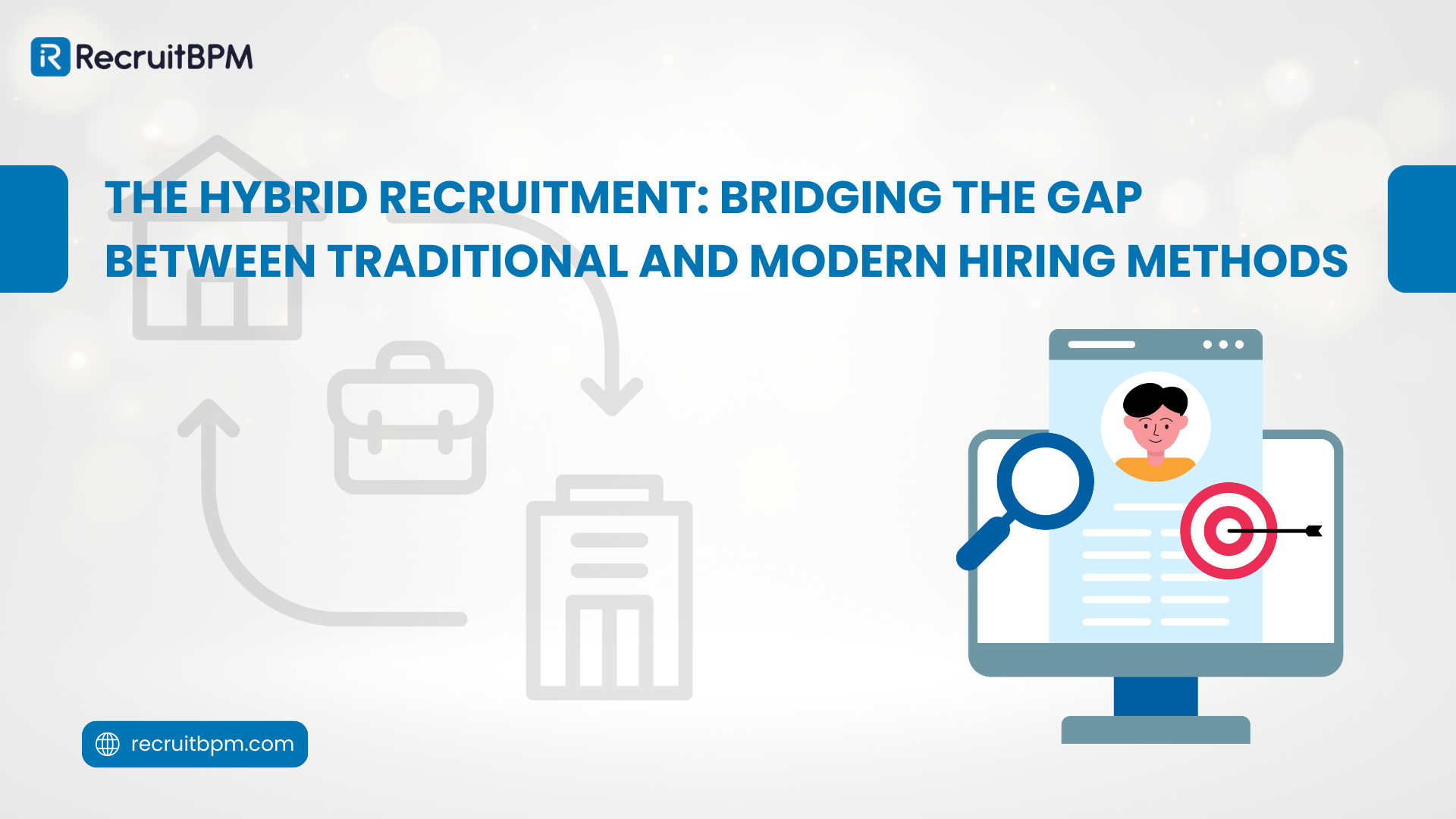Your agency posts a role on three job boards. Resumes flood in. Your recruiters screen candidates over video calls. Then your top pick ghosts the final in-person interview. Sound familiar?
This disconnect between virtual and in-person hiring stages costs staffing agencies thousands in lost placements every quarter. The solution isn’t choosing one method over the other. It’s a hybrid recruitment strategy that blends digital efficiency with face-to-face connection at every stage of your talent acquisition pipeline.
According to recent data, 28.2% of full-time employees now work in hybrid models. And 93% of employers conducting remote interviews plan to continue doing so. Your hiring process needs to match this reality.
This guide breaks down exactly how staffing agencies can build, optimize, and scale a hybrid recruitment strategy in 2026. You’ll learn which stages work best virtually, where in-person still wins, and how the right technology ties it all together. Whether you run an IT staffing firm or an executive search agency, this framework adapts to your specific placement needs.
What Is Hybrid Recruitment?
Hybrid recruitment is a talent acquisition strategy that combines virtual and in-person hiring methods into one seamless workflow. Rather than relying solely on face-to-face interviews or fully remote screening, it uses each approach where it delivers the most value.
For staffing agencies, this means sourcing and screening candidates digitally. Then you reserve in-person interactions for high-stakes moments. Think final interviews, client presentations, and onboarding.
The concept existed before 2020. But the pandemic forced rapid adoption of virtual tools. Now, hybrid hiring isn’t a temporary fix. It’s the standard operating model for agencies that want speed, reach, and quality in every placement.
How Hybrid Hiring Differs from Traditional Talent Acquisition?
Traditional talent acquisition follows a linear, mostly in-person path. Recruiters post jobs, collect paper or emailed resumes, and schedule office interviews. Every step requires physical presence or manual coordination.
Hybrid hiring replaces that rigid sequence with a flexible framework. Early-stage activities like sourcing, initial outreach, and pre-screening happen virtually. This saves your team hours of scheduling and travel.
Later stages of cultural fit assessments, client introductions, and final evaluations shift to in-person when the stakes are highest. The result is a process that moves faster without sacrificing the human connection that closes placements.
Why Staffing Agencies Are Shifting to Hybrid Models?
Staffing agencies operate under unique pressure. You manage dozens of open requisitions across multiple clients simultaneously. Speed-to-fill directly impacts revenue.
A fully in-person model can’t scale fast enough. A fully virtual model often misses the rapport-building that wins client trust. Hybrid recruitment gives your agency the ability to cast a wider geographic net while still delivering the personal touch clients expect.
Agencies using blended approaches report faster time-to-fill rates and broader candidate pools. When your competitors still rely on a single hiring method, a hybrid strategy becomes your competitive edge.
How Does a Hybrid Recruitment Model Work?
A hybrid recruitment model divides your hiring workflow into virtual-first and in-person stages. Each stage uses the method that maximizes efficiency and candidate engagement. The key is knowing where to draw the line.
Most successful agencies follow a simple rule. Automate and digitize everything before the shortlist. Humanize everything after it. This structure reduces time-per-hire while preserving the quality of candidate interactions that lead to accepted offers.
Virtual-First Stages (Sourcing, Screening, Assessments)
The top of your recruitment funnel benefits most from virtual tools. Job distribution across 5,000+ boards happens instantly through your ATS. AI-powered resume parsing filters hundreds of applications in minutes.
Initial candidate outreach through email sequences and LinkedIn messaging scales without adding headcount. Video screening calls replace phone tags and let you assess communication skills early. Skills assessments and pre-employment tests run asynchronously, so candidates complete them on their schedule.
This virtual-first approach lets your recruiters focus their energy on qualified candidates rather than administrative tasks.
In-Person Stages (Final Interviews, Client Presentations, Onboarding)
Once you’ve shortlisted top candidates, in-person interactions add the depth that virtual methods can’t replicate. Final interviews conducted face-to-face allow you to evaluate body language, cultural alignment, and interpersonal chemistry.
Client presentations, where you introduce your best candidates to hiring managers, often seal the deal in person. Candidates who meet the team and tour the workspace are more likely to accept offers. Onboarding orientations that combine virtual modules with in-person welcome sessions help new hires feel connected from day one.
The goal isn’t to eliminate virtual touchpoints at this stage. It’s to add strategic in-person moments that build trust and accelerate decisions.
5 Proven Hybrid Recruitment Strategies for 2026
Not every hybrid model looks the same. Your agency’s ideal approach depends on the roles you fill, your client expectations, and your team’s capacity. Here are three strategies that consistently deliver results for staffing agencies.
Blended Funnel Approach
This is the most common hybrid model. Virtual methods handle the top of your hiring funnel. In-person methods handle the bottom. Candidates experience a smooth transition between the two.
For example, your team sources candidates online, conducts video pre-screens, and administers digital assessments. Only shortlisted candidates move to in-person final interviews and client meetings. This structure keeps your cost-per-candidate low while maintaining a high-touch experience for serious contenders. Most agencies find that 70-80% of their hiring funnel can happen virtually without any loss in placement quality.
Parallel Virtual and In-Person Pipelines
Some agencies run virtual and in-person channels simultaneously throughout the entire process. A virtual career fair might run alongside an in-person networking event in the same week. Candidates choose the channel that suits them best.
This model works well for agencies filling high-volume roles across multiple regions. It increases your total candidate reach without forcing everyone through the same pipeline. The trade-off is higher coordination overhead, which is where strong becomes essential.
AI-Driven Candidate Matching with Human Follow-Up
This strategy leans heavily on AI for the initial match. Your ATS scans candidate profiles against job requirements and ranks them by fit. Automated outreach sequences engage top matches immediately.
Once a candidate responds positively, a human recruiter takes over. They conduct personalized conversations, schedule in-person meetings, and manage the relationship through placement. This approach maximizes the volume your team can handle without sacrificing the personal connection that candidates value.
Benefits of Hybrid Recruitment for Staffing Agencies
Hybrid recruitment isn’t just a trend. It delivers measurable advantages that directly impact your agency’s bottom line. Here’s what the data shows.
Faster Time-to-Fill and Reduced Cost-Per-Hire
Virtual screening eliminates the scheduling delays that slow traditional hiring. When your recruiter can conduct five video pre-screens in a morning instead of one in-person interview, your pipeline moves faster.
Agencies using hybrid approaches have reported time-to-hire reductions of over 20%. The cost savings add up quickly, too. No travel expenses for early-stage meetings. No venue fees for initial screening events. No printed materials for first-round assessments.
Wider Talent Pool Across Geographies
When your sourcing and screening happen virtually, geography stops being a barrier. Your agency can fill a role in Texas with a candidate from Ohio without anyone boarding a plane until the final round.
This expanded reach is critical for specialized staffing sectors like IT, healthcare, and executive search. The best candidate for a niche role probably isn’t in your city. Hybrid recruitment ensures you find them anyway.
Improved Candidate and Client Experience
Candidates appreciate flexibility. Offering virtual options for early stages shows respect for their time. Meanwhile, reserving in-person touchpoints for key moments signals that your agency values personal connection.
Clients benefit too. When you present pre-vetted, pre-screened candidates who’ve already demonstrated fit through virtual assessments, in-person introductions become more productive. Everyone’s time is better spent. That efficiency builds client loyalty and repeat business.
Common Challenges of Hybrid Hiring (And How to Solve Them)
Hybrid recruitment isn’t without friction. Knowing the common pitfalls helps you avoid them before they derail your process.
Tool Fragmentation Across Virtual and In-Person Workflows
Many agencies cobble together separate tools for each stage. One platform for job posting. Another for video interviews. A spreadsheet for tracking candidate progress. A CRM for client communication. This fragmented stack creates data silos that slow your team down.
The fix is consolidation. A unified platform that handles sourcing, screening, interviewing, and client management in one place eliminates the constant context-switching. Your recruiters stop copying data between systems and start focusing on placements.
Maintaining Consistent Candidate Communication
When candidates move between virtual and in-person stages, communication gaps often appear. A candidate who had a great video screen might wait days for an in-person interview invitation. That silence kills engagement.
Automated communication workflows solve this. Your system should trigger personalized follow-ups at every stage transition. Email templates, SMS notifications, and calendar invites should fire automatically based on candidate status changes.
Resistance to Change Within Recruiting Teams
Some recruiters prefer the methods they know. Asking a tenured recruiter to adopt video screening or AI-powered matching can meet pushback. The key is demonstrating results, not mandating compliance.
Start with a pilot. Let one team member test the hybrid workflow on a handful of requisitions. When their time-to-fill drops and placement rate holds, the rest of the team follows voluntarily. Training and ongoing support accelerate adoption further. Document wins early and share them across your team to build momentum.
How ATS and CRM Technology Power Hybrid Recruitment?
Technology is the backbone of any successful hybrid recruitment strategy. Without the right platform, the transition between virtual and in-person stages breaks down. Here’s what to look for.
Unified Candidate Tracking Across Virtual and In-Person Touchpoints
Your ATS should track every candidate interaction regardless of channel. Whether a candidate applied through a job board, was sourced on LinkedIn, screened over video, or interviewed in person, it all lives in one record.
RecruitBPM’s unified ATS+CRM platform does exactly this. Every touchpoint, from first contact to final placement, appears in a single candidate timeline. Your recruiters never lose context when a candidate moves between virtual and in-person stages.
AI Automation for Screening, Scheduling, and Follow-Ups
Manual tasks are the enemy of a fast hybrid workflow. AI-powered resume parsing, automated interview scheduling, and triggered email sequences free your recruiters to focus on relationship-building.
With 5,000+ job board integrations and built-in AI matching, RecruitBPM automates the high-volume virtual stages of your pipeline. Your team spends less time on data entry and more time on the human interactions that close deals. At $89/month per user, it’s built for agencies that need enterprise-level automation without enterprise-level pricing.
Real-Time Analytics to Optimize Your Hybrid Funnel
You can’t improve what you don’t measure. Your platform should show you exactly where candidates drop off, which stages take the longest, and which channels produce the best hires.
Real-time dashboards let you compare virtual versus in-person conversion rates. If your video pre-screen stage has a 70% pass rate but your in-person final interviews only convert 30%, you know where to focus improvements. Data-driven decisions turn a good hybrid strategy into a great one. Over time, these insights help you fine-tune which stages deserve more personal attention and which can stay fully automated.
How to Build a Hybrid Recruitment Strategy for Your Agency?
Ready to implement? Follow these three steps to design a hybrid model tailored to your agency’s needs.
Step 1: Audit Your Current Hiring Workflow
Map every step of your current process from job intake to placement. Identify which stages already happen virtually and which are in-person. Note where bottlenecks occur and where candidates drop off.
This audit reveals quick wins. Maybe your team already does phone screens but hasn’t switched to video. Maybe your onboarding is entirely in-person when half of it could be digital. Document every stage before making changes. Talk to your recruiters about what’s working and what feels like wasted effort. Their frontline insights will shape a more practical hybrid model.
Step 2: Define Virtual vs. In-Person Stages
Assign each stage to the method that delivers the best outcome. Use this framework as a starting point:
- Virtual: Job posting, sourcing, initial outreach, resume screening, skills assessments, pre-screen interviews, reference checks
- In-Person: Final interviews, client presentations, facility tours, onboarding orientations, team introductions
- Flexible (candidate’s choice): Mid-stage interviews, follow-up meetings, offer discussions
Your specific mix depends on your industry focus and client preferences. An IT staffing agency may keep almost everything virtual. A healthcare staffing firm may need more in-person clinical evaluations.
Step 3: Choose the Right Technology Stack
Your hybrid model is only as strong as the technology supporting it. Prioritize platforms that combine ATS and CRM functionality in one system. Fragmented tool stacks create the exact inefficiencies hybrid recruitment is supposed to eliminate.
Look for these capabilities: AI-powered candidate matching, automated multi-channel communication, video interview integration, mobile-first design for on-the-go recruiters, and real-time analytics dashboards. The right platform scales with your agency as your hybrid workflows mature. Avoid building a Frankenstein stack of disconnected point solutions. Integration headaches will undo the efficiency gains hybrid recruitment is supposed to deliver.
FAQs About Hybrid Recruitment
What is hybrid recruitment?
Hybrid recruitment is a talent acquisition strategy that combines virtual and in-person hiring methods. It uses digital tools for sourcing, screening, and initial assessments. In-person interactions are reserved for final interviews, client presentations, and onboarding. This approach maximizes speed and reach while preserving the human connection that drives quality placements.
Is hybrid recruitment better than fully virtual hiring?
For most staffing agencies, yes. Fully virtual hiring works for some roles and industries. But candidates and clients often value face-to-face interaction during critical decision points. Hybrid recruitment gives you the efficiency of virtual methods plus the trust-building power of in-person meetings. It’s the best of both approaches without the limitations of either.
What tools do staffing agencies need for hybrid recruitment?
At minimum, you need a unified ATS+CRM platform that tracks candidates across both virtual and in-person stages. Look for AI-powered screening, automated communication workflows, job board integrations, video interview capabilities, and real-time analytics. Platforms like RecruitBPM combine all these features in one system, eliminating the tool fragmentation that undermines hybrid workflows. Schedule a free demo to see how it works.

















